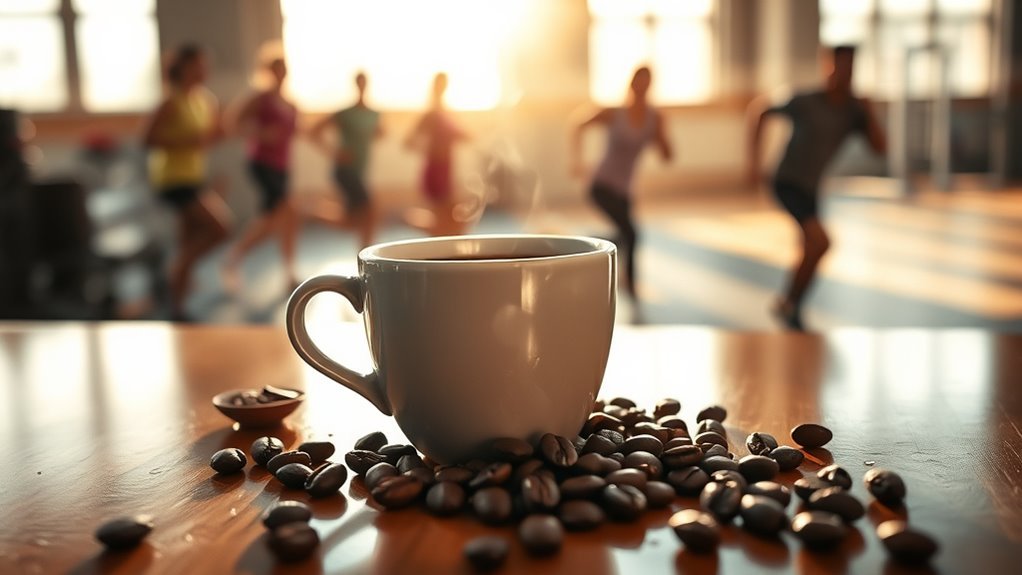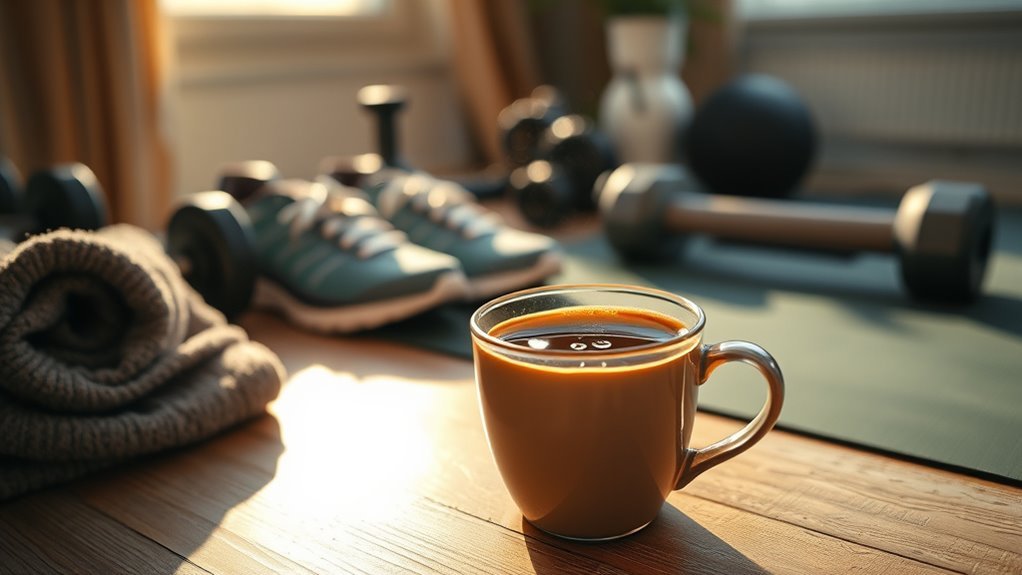The Science of Coffee and Exercise
Coffee enhances athletic performance through its caffeine content, improving energy metabolism and endurance. By increasing adrenaline levels, it helps you focus and react faster during workouts. Drinking coffee 30-60 minutes before exercising can delay fatigue and sustain your energy levels. Post-workout, it may reduce muscle soreness and aid in recovery. However, be cautious of dehydration and disrupted sleep from excessive consumption. There’s much more to explore about coffee’s effects on fitness, ensuring you make informed choices.
The Role of Caffeine in Athletic Performance

How does caffeine really impact your athletic performance? Caffeine’s role in performance enhancement lies in its ability to improve energy metabolism. When you consume caffeine, it’s rapidly absorbed and metabolized, leading to increased adrenaline levels. This boost can enhance your focus and reaction time, making you feel more alert during workouts. Research shows that caffeine can increase endurance, allowing you to push through fatigue longer than without it. Additionally, it may help in glycogen sparing, meaning your body taps into fat stores more efficiently, preserving carbohydrates for later stages of exercise. So, if you’re looking to elevate your performance, understanding caffeine metabolism can help you harness its benefits effectively, giving you that extra edge in your training.
Enhancing Endurance: How Coffee Can Help
Caffeine isn’t just about sharpening focus and reaction times; it also plays a significant role in enhancing endurance during exercise. When you consume coffee, it boosts your metabolism, allowing your body to utilize fat as a fuel source more efficiently. This shift can help you sustain energy levels longer, especially during prolonged workouts. To maximize these benefits, pay attention to caffeine timing. Consuming coffee about 30 to 60 minutes before your workout can optimize its effects, improving your performance and delaying fatigue. This means you can push yourself further and enjoy that exhilarating freedom that comes with endurance training. So, next time you lace up your shoes, consider a cup of coffee to fuel your journey!
The Impact of Coffee on Recovery Post-Workout

While many focus on coffee’s role in boosting performance, its impact on recovery post-workout shouldn’t be overlooked. Research shows that coffee can enhance muscle recovery by reducing soreness and inflammation. The caffeine in coffee promotes glycogen replenishment, which is essential after intense exercise. Additionally, enjoying a cup of coffee after your workout can help maintain your hydration balance. Hydration is critical for ideal recovery, and coffee can contribute to your fluid intake without greatly increasing dehydration risk. So, if you’re looking to speed up your recovery process, consider incorporating coffee into your post-workout routine. It not only satisfies your taste buds but also brings valuable recovery benefits that can help you bounce back stronger.
Potential Drawbacks of Coffee Consumption for Athletes
Although coffee can offer several benefits for athletes, it is vital to be aware of its potential drawbacks. One major concern is dehydration risks; caffeine is a diuretic, which means it can lead to increased urination and fluid loss. If you’re not careful, this could affect your performance and recovery. Additionally, consuming coffee, especially later in the day, can cause sleep disruption. Poor sleep can hinder your overall athletic performance, impair recovery, and affect your mental focus during workouts. So, while enjoying your cup of coffee, be mindful of how it impacts your hydration and sleep. Balancing these factors is essential to guarantee that coffee enhances rather than detracts from your athletic pursuits.
Tips for Incorporating Coffee Into Your Fitness Routine

To effectively incorporate coffee into your fitness routine, consider timing your consumption strategically. Aim to drink coffee about 30-60 minutes before your workout to maximize its performance-enhancing effects. Follow these dosage guidelines to guarantee you’re getting the most out of your coffee without overdoing it.
| Time Before Workout | Coffee Type | Recommended Dose |
|---|---|---|
| 30-60 minutes | Espresso | 1-2 shots |
| 30-60 minutes | Brewed Coffee | 1 cup (8 oz) |
| 30-60 minutes | Cold Brew | 1 cup (8 oz) |
| 30-60 minutes | Instant Coffee | 1-2 packets |
| Post-Workout | Any Coffee | Optional |
Frequently Asked Questions
Does Coffee Affect Hydration Levels During Exercise?
You might’ve heard hydration myths suggesting coffee dehydrates you during exercise, but that’s not entirely true. Research shows that moderate coffee consumption doesn’t greatly impact hydration levels. In fact, it can enhance exercise performance by improving endurance and focus. So, if you enjoy your cup before a workout, you’re likely fine. Just remember to stay mindful of your overall fluid intake to guarantee your body stays hydrated and ready to perform at its best.
Can Decaf Coffee Provide Benefits for Athletes?
Decaf coffee can definitely provide benefits for athletes, especially if you’re looking for caffeine alternatives. It retains many antioxidants and nutrients found in regular coffee, which can aid in recovery and reduce inflammation. Plus, it won’t disrupt your sleep like caffeinated options might. If you want to enjoy the taste and benefits without the jitters, decaf could be a great addition to your routine, helping you perform better without the side effects of caffeine.
How Much Coffee Is Too Much for Optimal Performance?
When it comes to coffee, it’s all about finding your balance. Most studies suggest that 3 to 6 mg of caffeine per kilogram of body weight is effective for performance, but everyone’s different due to caffeine tolerance. Going beyond these performance thresholds can lead to jitters, anxiety, or decreased performance. Listen to your body; if you feel off or overly stimulated, it’s a sign to cut back and find your ideal amount.
Does Coffee Consumption Vary Among Different Sports?
Absolutely, coffee consumption does vary among different sports. You’ll find that athletes often have unique coffee preferences based on sport-specific impacts. For instance, endurance runners may rely on coffee for its stamina-boosting effects, while weightlifters might use it to enhance focus during training. Understanding these variations can help you tailor your caffeine intake to optimize performance, ensuring you get the most out of your workouts while enjoying your favorite brew.
Are There Alternatives to Coffee for Caffeine Intake?
If you’re looking for alternatives to coffee for caffeine intake, there are several tea alternatives you might consider. Green tea and matcha are popular choices, providing a gentler caffeine boost along with antioxidants. Yerba mate and guayusa are also excellent caffeine sources, offering unique flavors and additional health benefits. Additionally, energy drinks and certain supplements can provide that extra kick. Exploring these options can help you find what works best for your lifestyle.






